Filter by

Furnishing the mind : concepts and their perceptual basis
"A Bradford book."Western philosophy has long been divided between empiricists, who argue that human understanding has its basis in experience, and rationalists, who argue that reason is the source of knowledge. A central issue in the debate is the nature of concepts, the internal representations we use to think about the world. The traditional empiricist thesis that concepts are built up from …
- Edition
- -
- ISBN/ISSN
- 9780262281935
- Collation
- 1 online resource (x, 358 pages) :illustrations
- Series Title
- Representation and Mind series
- Call Number
- 100 PRI f
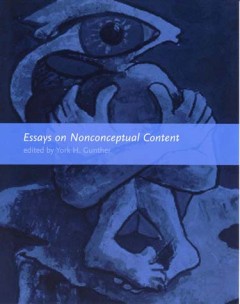
Essays on Nonconceptual Content
"A Bradford book."According to the widespread conceptualist view, all mental contents are governed by concepts an individual possesses. In recent years, however, an increasing number of philosophers have argued for the indispensability of nonconceptual content based on perceptual, emotional, and qualitative experiences; informational and computational states; memory; and practical knowledge. Wr…
- Edition
- -
- ISBN/ISSN
- 9780262274524
- Collation
- 1 online resource (339 pages)
- Series Title
- -
- Call Number
- -
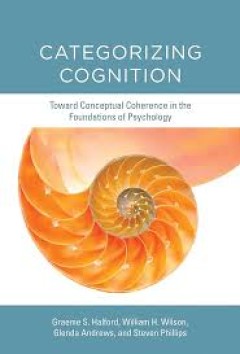
Categorizing Cognition: Toward Conceptual Coherence in the Foundations of Psy…
A proposal for a categorization of cognition based on core properties of the constituent processes that integrates theory and empirical findings across domains.OCLC-licensed vendor bibliographic record.
- Edition
- -
- ISBN/ISSN
- 0262320703
- Collation
- 1 online resource (xiii, 358 pages) :illustrations (some color)
- Series Title
- -
- Call Number
- -
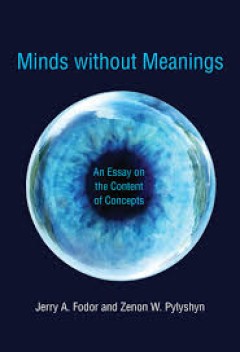
Minds without Meanings: An Essay on the Content of Concepts
Two prominent thinkers argue for the possibility of a theory of concepts that takes reference to be concepts' sole semantic property.OCLC-licensed vendor bibliographic record.
- Edition
- -
- ISBN/ISSN
- 9780262320320
- Collation
- 1 online resource (193 pages) :illustrations
- Series Title
- -
- Call Number
- -

Knowledge, concepts, and categories /
The study of mental representation is a central concern in contemporary cognitive psychology. Knowledge, Concepts, and Categories is unusual in that it presents key conclusions from across the different subfields of cognitive psychology. Readers will find data from many areas, including developmental psychology, formal modeling, neuropsychology, connectionism, and philosophy. The difficulty of …
- Edition
- 1
- ISBN/ISSN
- 9780262621182
- Collation
- -
- Series Title
- -
- Call Number
- -
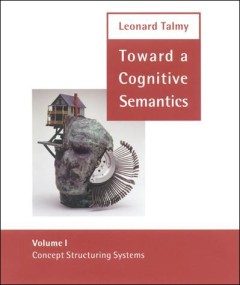
Toward a Cognitive Semantics: Concept Structuring Systems
Rev. and expanded version of papers, essays, etc. published during the last twenty years; cf. v. 1, p. 6."A Bradford book."In this two-volume set, Talmy approaches the question of how language organizes conceptual material both at a general level and by analyzing a crucial set of particular conceptual domains: space and time, motion and location, causation and force interaction, and attention a…
- Edition
- -
- ISBN/ISSN
- 9780262284660
- Collation
- 1 online resource (viii, 565 pages) :illustrations.
- Series Title
- -
- Call Number
- -
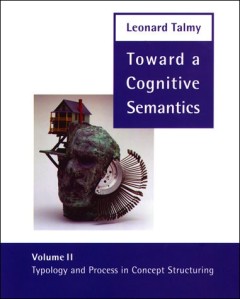
Toward a Cognitive Semantics: Typology and Process in Concept Structuring
A Bradford book."In this two-volume set, Talmy approaches the question of how language organizes conceptual material both at a general level and by analyzing a crucial set of particular conceptual domains: space and time, motion and location, causation and force interaction, and attention and viewpoint.One of a two-volume set defining the field of cognitive semantics. Leonard Talmy approaches t…
- Edition
- -
- ISBN/ISSN
- 9780262284677
- Collation
- 1 online resource (viii, 495 pages) :illustrations.
- Series Title
- -
- Call Number
- -
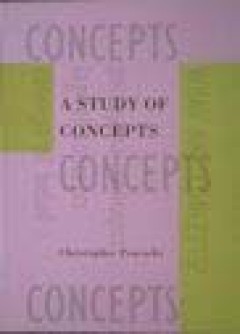
A Study of Concepts
A Bradford book."OCLC-licensed vendor bibliographic record.
- Edition
- -
- ISBN/ISSN
- 9780262281317
- Collation
- 1 online resource (xiii, 266 pages) :illustrations.
- Series Title
- -
- Call Number
- -

Concepts, kinds, and cognitive development
In Concepts, Kinds, and Cognitive Development, Frank C. Keil provides a coherent account of how concepts and word meanings develop in children, adding to our understanding of the representational nature of concepts and word meanings at all ages. "A Bradford book."Includes indexes.OCLC-licensed vendor bibliographic record.
- Edition
- -
- ISBN/ISSN
- 9780262276900
- Collation
- 1 online resource (xv, 328 pages) :illustrations.
- Series Title
- -
- Call Number
- -
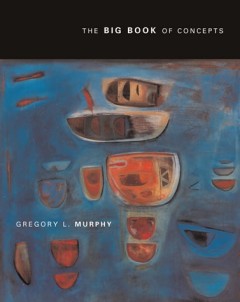
The big book of concepts
"A Bradford book."Concepts embody our knowledge of the kinds of things there are in the world. Tying our past experiences to our present interactions with the environment, they enable us to recognize and understand new objects and events. Concepts are also relevant to understanding domains such as social situations, personality types, and even artistic styles. Yet like other phenomenologically …
- Edition
- -
- ISBN/ISSN
- 9780262280358
- Collation
- 1 online resource (555 pages) :illustrations.
- Series Title
- -
- Call Number
- -
 Computer Science, Information & General Works
Computer Science, Information & General Works  Philosophy & Psychology
Philosophy & Psychology  Religion
Religion  Social Sciences
Social Sciences  Language
Language  Pure Science
Pure Science  Applied Sciences
Applied Sciences  Art & Recreation
Art & Recreation  Literature
Literature  History & Geography
History & Geography